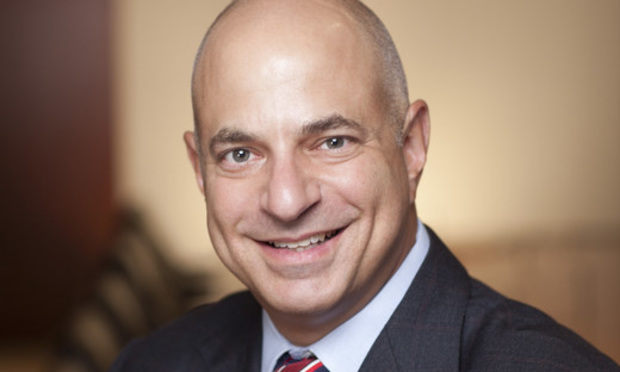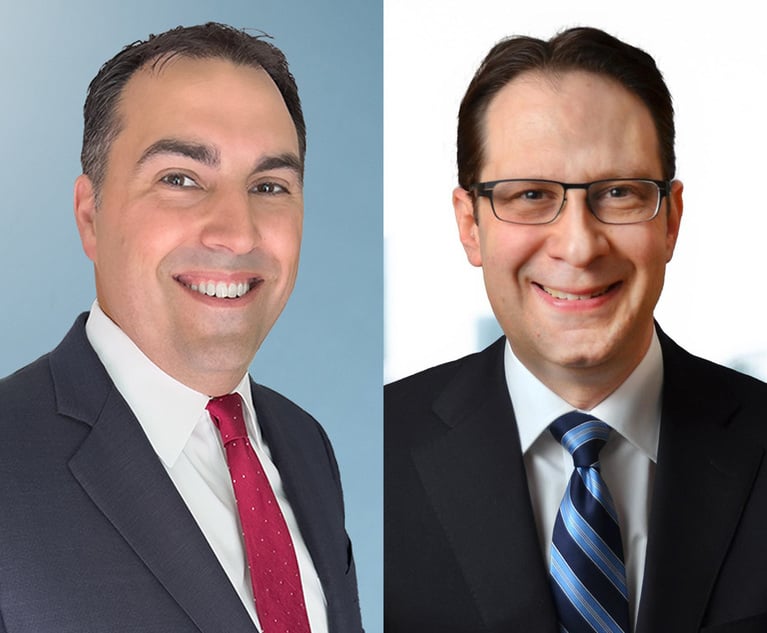Midsized NY Law Firms See Flexible Fees as Competitive Advantage
Midsized law firms aren't waiting for clients to suggest alternative fee arrangements. They're aggressively selling dozens of pricing strategies as a way to differentiate themselves from what they see as their competition—all the other great lawyers in New York.
December 28, 2017 at 03:36 PM
5 minute read

Midsized law firms aren't waiting for clients to suggest alternative fee arrangements. They're aggressively selling dozens of pricing strategies as a way to differentiate themselves from what they see as their competition—all the other great lawyers in New York.
In interviews and Q&As with Pryor Cashman, Harter Secrest & Emery, Otterbourg and Morrison Cohen, law firm leaders in New York showed absolutely no allegiance to the billable hour.
That sentiment differs somewhat from midsized law firms around the country, which are generally less likely to innovate on price than their larger competitors. According to Altman Weil's 2017 Law Firms in Transition survey, 58 percent of law firms across the country with more than 250 lawyers have significantly changed their pricing strategies,but when it comes to midsize and smaller firms (with 250 or fewer lawyers) that figure drops to 33.2 percent.
David Scherl, chairman and managing partner of Morrison Cohen, which has 100 attorneys and offices in the heart of midtown, said the firm charges about 30 percent less than its Big Law competitors. His educated guess is that about one-third of the firm's business is no longer calculated on the basis of the billable hour.
“Our partners understand that it gives us another weapon to use to service our clients, to serve their needs,” he said. “You're giving the control back to clients where they don't feel like you're just turning on the clock.”
To work, alternative fees have to be a good deal for both the clients and firm, Scherl said. Morrison Cohen offers an upper and lower range rather than a fixed fee in which both law firm and client take a calculated risk. If the legal work turns out to be more complicated than anticipated, the firm won't collect above the upper range and if it's easier to handle than expected, the client still pays at the lower end of the range.
“We're all making an educated bet together and we're going to live with this fee,” he said.
Craig Wittlin, managing partner of Harter Secrest & Emery in upstate New York, said alternative fees are easier for his firm because it has a “lockstep with accountability” compensation policy for partners. That means that after a decade as a partner, all partners receive the same pay regardless of business development, personal productivity or other metrics.
“Our partners don't feel that if they're making an investment in a client that it's going to affect their compensation for the year. It better situates us to be flexible, to be creative, to focus on the long-term relationship building with our clients, that gives them great freedom to take the long view,” he said.
Alternative fees impose discipline on the firm, he said, because the firm will make more if it's more cost-effective. “It's about finding ways to be more efficient with the same kind of work, transparency and predictability,” he said.
Wittlin said that while the legal media predicted a dramatic move toward alternative fees after the recession, his firm didn't feel much pressure until the past couple of years. Now, even though “lawyers don't like change,” almost everyone in the firm is embracing new ways of doing business, he said.
Ronald Shechtman, managing partner of Pryor Cashman, said the firm has seen an increase in client requests for alternative fees.
“Our firm's size and flexibility have made it easier for us to address these requests than our larger competitors,” he said. “We currently have more than a dozen operative alternative fee arrangements, and they have resulted in an increased level of satisfaction for our clients.
“I think the legal profession by writing and talking so much about this has emboldened clients to pursue and think about other compensation policies for their attorneys,” he said.
All the firms stressed that there are many variations on alternative fees. “I think they're like snowflakes. No two are alike,” Shechtman said.
He stressed that alternative fees don't have to mean lower compensation for the firm. “We try to make sure alternative fee arrangements yield a fair result for both the client and the firm. If it's unfair to either, there's a serious failure.”
Richard Stehl, the chairman of Otterbourg, which has 50 attorneys, said the firm has at least two dozen different fee arrangements. Some of them might be unusual such as hiring an in-house attorney and bringing the firm's business with the lawyer. The company keeps the same attorney and the firm is able to assign the lawyer work for other clients.
“We're thrilled with it because we got more business and they're thrilled with it because they reduced their overhead,“ he said.
Coming up with the right pricing model might take several tries. “Sometimes our initial solution isn't correct or doesn't resonate with them and we start talking about it and we come up with a solution for them that they're thrilled with,” Stehl said.
Offering an alternative fee doesn't mean that the firm has to deal with reduced revenue. “I think that a lot of lawyers think that's what it means and that's why there has been a real hesitation for Big Law and maybe even midsize firms to embrace it,” he said.
It's easier to get partners to buy into alternative fees when the firm is smaller, Stehl said.
“When you're at a midsize firm you sort of understand that a rising tide lifts all ships. So we do talk about these things and we do agree about these things and we act in unison and that benefits the firm as a whole. I don't know that's possible when you have 200 partners,” he said.
This content has been archived. It is available through our partners, LexisNexis® and Bloomberg Law.
To view this content, please continue to their sites.
Not a Lexis Subscriber?
Subscribe Now
Not a Bloomberg Law Subscriber?
Subscribe Now
NOT FOR REPRINT
© 2025 ALM Global, LLC, All Rights Reserved. Request academic re-use from www.copyright.com. All other uses, submit a request to [email protected]. For more information visit Asset & Logo Licensing.
You Might Like
View All
Long Island Midsize Firm and Managing Partner Sued for Sexual Harassment, Discrimination
6 minute read
King & Spalding Adds Veteran Antitrust Litigator From White & Case in New York
3 minute read

Troutman Pepper Accused of Inattentive Case Management in $59M Malpractice Suit
7 minute readTrending Stories
- 1People in the News—Feb. 6, 2025—Unruh Turner, Fox Rothschild
- 2‘Listen, Listen, Listen’: Practice Tips From Judges in the Oakland Federal Courthouse
- 3Gertrude Stein Is Right On Again
- 4Georgia's Next Judge? Sole Candidate Shortlisted to Rise to Bench
- 5The End of Innocence? DEP’s End Run Around ‘All Appropriate Inquiry’ Spill Act Protections
Who Got The Work
J. Brugh Lower of Gibbons has entered an appearance for industrial equipment supplier Devco Corporation in a pending trademark infringement lawsuit. The suit, accusing the defendant of selling knock-off Graco products, was filed Dec. 18 in New Jersey District Court by Rivkin Radler on behalf of Graco Inc. and Graco Minnesota. The case, assigned to U.S. District Judge Zahid N. Quraishi, is 3:24-cv-11294, Graco Inc. et al v. Devco Corporation.
Who Got The Work
Rebecca Maller-Stein and Kent A. Yalowitz of Arnold & Porter Kaye Scholer have entered their appearances for Hanaco Venture Capital and its executives, Lior Prosor and David Frankel, in a pending securities lawsuit. The action, filed on Dec. 24 in New York Southern District Court by Zell, Aron & Co. on behalf of Goldeneye Advisors, accuses the defendants of negligently and fraudulently managing the plaintiff's $1 million investment. The case, assigned to U.S. District Judge Vernon S. Broderick, is 1:24-cv-09918, Goldeneye Advisors, LLC v. Hanaco Venture Capital, Ltd. et al.
Who Got The Work
Attorneys from A&O Shearman has stepped in as defense counsel for Toronto-Dominion Bank and other defendants in a pending securities class action. The suit, filed Dec. 11 in New York Southern District Court by Bleichmar Fonti & Auld, accuses the defendants of concealing the bank's 'pervasive' deficiencies in regards to its compliance with the Bank Secrecy Act and the quality of its anti-money laundering controls. The case, assigned to U.S. District Judge Arun Subramanian, is 1:24-cv-09445, Gonzalez v. The Toronto-Dominion Bank et al.
Who Got The Work
Crown Castle International, a Pennsylvania company providing shared communications infrastructure, has turned to Luke D. Wolf of Gordon Rees Scully Mansukhani to fend off a pending breach-of-contract lawsuit. The court action, filed Nov. 25 in Michigan Eastern District Court by Hooper Hathaway PC on behalf of The Town Residences LLC, accuses Crown Castle of failing to transfer approximately $30,000 in utility payments from T-Mobile in breach of a roof-top lease and assignment agreement. The case, assigned to U.S. District Judge Susan K. Declercq, is 2:24-cv-13131, The Town Residences LLC v. T-Mobile US, Inc. et al.
Who Got The Work
Wilfred P. Coronato and Daniel M. Schwartz of McCarter & English have stepped in as defense counsel to Electrolux Home Products Inc. in a pending product liability lawsuit. The court action, filed Nov. 26 in New York Eastern District Court by Poulos Lopiccolo PC and Nagel Rice LLP on behalf of David Stern, alleges that the defendant's refrigerators’ drawers and shelving repeatedly break and fall apart within months after purchase. The case, assigned to U.S. District Judge Joan M. Azrack, is 2:24-cv-08204, Stern v. Electrolux Home Products, Inc.
Featured Firms
Law Offices of Gary Martin Hays & Associates, P.C.
(470) 294-1674
Law Offices of Mark E. Salomone
(857) 444-6468
Smith & Hassler
(713) 739-1250






